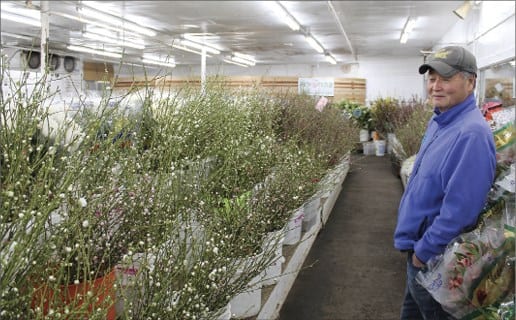Allan Nishita, co-owner of Flora Fresh in Sacramento, looks over peach-blossom branches in one of his coolers. These branches would normally be used in decorative arrangements, but with events such as weddings being postponed or canceled because of the COVID-19 pandemic, sales have dropped and Nishita has been scrambling to keep his wholesale company’s doors open. Photo/Kevin Hecteman April 5, 2020 – By Kevin Hecteman – The COVID-19 pandemic has not been kind to California flower growers. "Our sales are way down," said Ivor Van Wingerden, who runs the Nipomo operations of Carpinteria-based flower grower Ocean Breeze. "We basically lost 90-95% of sales, and we’re starting to slowly move back up." His experience is typical, according to Dave Pruitt, chief executive of the California Cut Flower Commission. "Many of my growers right now are functioning, or trying to function, with 15 to 20% of their business, max," Pruitt said. "And that happened rapidly." Most retail florists have closed, and many events for which people would buy flowers have been postponed or canceled. Allan Nishita, co-owner of flower wholesaler Flora Fresh in Sacramento, said business dropped particularly in the past two to three weeks, as wedding and event planners canceled orders. "That’s why I have so much product, because all the weddings were canceled," Nishita said. "Any kind of major gathering or event was canceled." California accounts for 80% of domestic flower production, Pruitt said, but some of the state’s 120 growers face closure due to pandemic-related losses. "I have one company that just told me they’ve closed permanently," he said, "and I will get more." Flower grower Mike Mellano of Oceanside has suspended most operations. "This crisis couldn’t have hit at a worse time," Mellano said. "We were on a record pace for sales, and within about three or four days, we went from record pace to less than 10% of historical." Coupled with that was "a tremendous amount of unpredictability," he said, which led him to suspend most business activities except for irrigation and pest control. "A big percentage of our crop mix are perennials that will be […]






